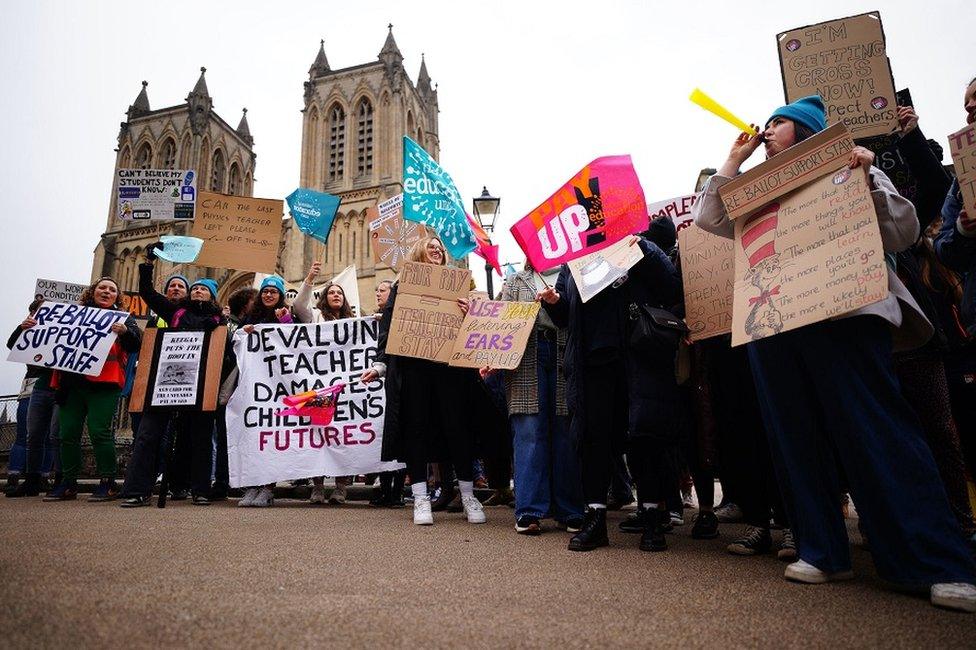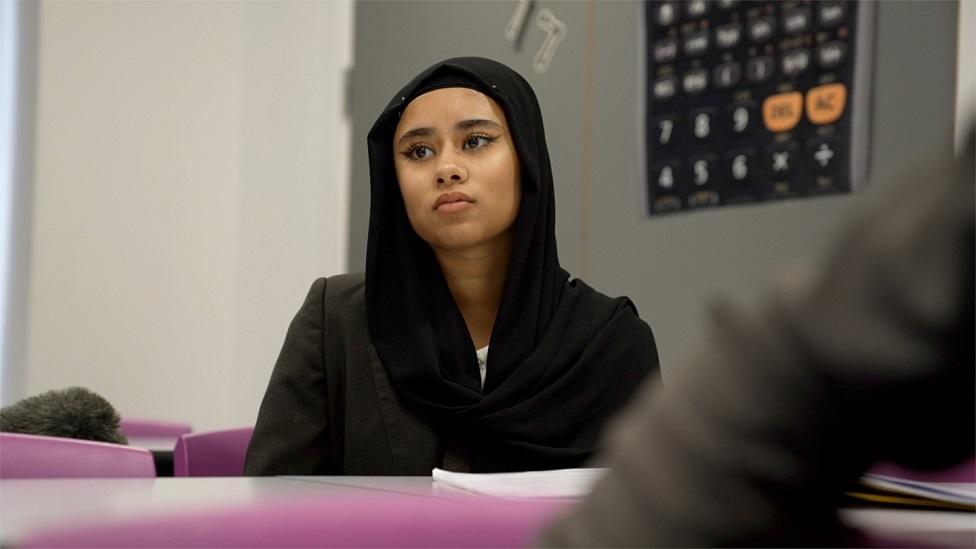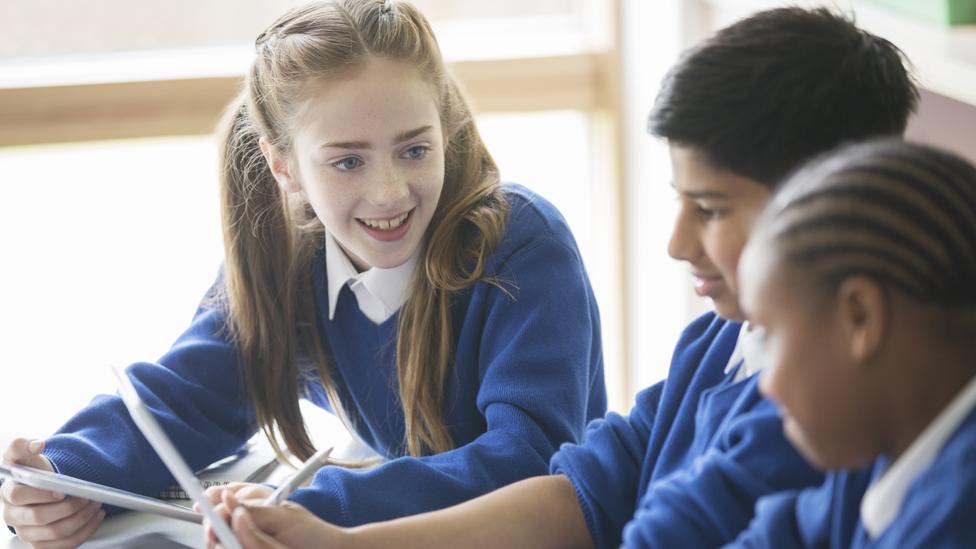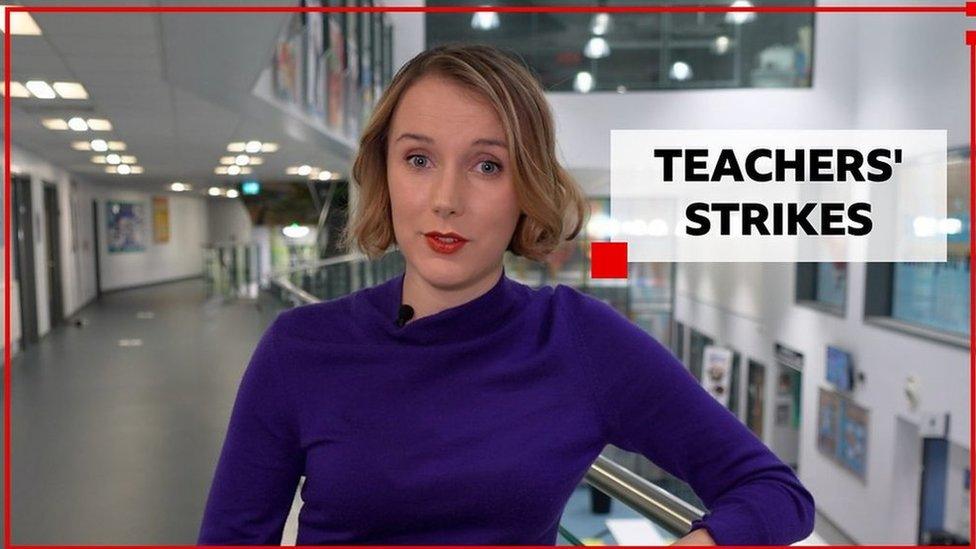England's teachers' strike causes more disruption
- Published

Members of the National Education Union joined picket lines across England on Thursday and are also due to strike on 2 May
Teachers in schools and sixth form colleges have joined picket lines in England for the fourth day of national strike action.
The National Education Union (NEU) said it regrets any disruption, and has put measures in place to make sure exam students are able to attend school.
Education Secretary Gillian Keegan said the strike action was "extremely disappointing".
Members of the union are also planning to strike on 2 May.
More than half of England's 22,000 schools either closed or partially closed on previous strike days.
Speaking on the picket line at a rally in Oxford, Dr Mary Bousted, NEU joint general secretary, said members wanted to see "a long-term correction in teacher pay over the next few years" and hopes the government will restart negotiations.
The NEU, along with three other teaching unions, has rejected an offer which included a £1,000 one-off payment and a 4.3% pay rise for most staff in September. The starting salary for teachers in England is also due to rise to £30,000 a year by September.
The government said the decision on how much to pay teachers will now be made by the pay review body, which previously recommended a 3% rise from September.
Ms Keegan said she was urging schools to prioritise vulnerable pupils and key workers' children, and most importantly the "exam cohort".
This year, exams return to the way they operated before the pandemic, which is why she is urging schools to "stay open" for exam students, who will not receive any extra help.

Classes for GCSE, A-level and vocational exam students took place at Cheney School in Oxford on Thursday
Both A-level and GCSE exams begin on 15 May.
The NEU says it would support arrangements to "provide the minimum level of teaching staff needed" on strike days so exam students can attend school for revision activities or exam practice.
Exam classes may not be taught by their normal teacher on strike days.
One school where teachers were on strike on Thursday was Cheney School in Oxford. However, the school was open to exam students, vulnerable pupils and key workers' children.
Barke, a Year 11 student, is doing GCSEs in Spanish, drama, history and food tech. She said it was "weird seeing teachers shouting on the streets saying 'we need more pay' because you don't see them like that, but at the same time we understand because what they're going through is not fair".
Teachers' pay has dropped by 11% between 2010 and 2022, after taking inflation into account, according to the Institute for Fiscal Studies.
Unions want an above inflation pay rise that does not come from schools' existing budgets.
Both Labour and the Liberal Democrats want to see negotiations start again.
Labour's shadow education secretary Bridget Phillipson said ministers' continual refusal to sit down with teachers had resulted in "many months of avoidable disruption to children's learning".
Liberal Democrat education spokeswoman Munira Wilson said: "We've already seen far too many GCSE and A-levels wrecked during the pandemic - the current crop of pupils mustn't become more casualties of Conservative chaos."
A Department for Education official said school funding would be at its highest level in history next year "thanks to the further £2bn pounds we are investing in our schools".
The NEU is expected to announce three more strikes during the summer term, and two of the other unions are currently balloting their members on strike action.
Most schools in Northern Ireland closed on Wednesday as teachers in five unions went on strike.

'I work two extra jobs to make ends meet'
By Emma Pengelly

Shim Amin said without the additional jobs her family would have to cut back significantly
Science teacher Shim Amin has to do two extra jobs at weekends and during school holidays to make ends meet.
The 28-year-old, from Guildford, works in an NHS crisis centre for up to seven hours most Saturdays and Sundays, and in the holidays cares for foster children in a children's residential home, sometimes working overnight shifts.
Despite being in the upper pay range for teachers, NEU member Shim said that without the two extra jobs "a lot of things would have to be cut".
Shim lives with her sister and nephew, who she helps to support, and said: "How is it that I'm working in a respected profession, but I am having to work extra just to feed the family?
"It's a real struggle. Can we afford petrol? Can my nephew afford that school trip?"
Shim, who teaches biology, chemistry and physics to 11 to 16-year-olds in Camberley, said teachers' workload has increased around improving attendance and providing pastoral care post-Covid.
"If I could start my career again, I wouldn't want to do teaching," she said.

Are you a striking teacher? Or a parent or student concerned about exam preparations potentially being affected? Share your experiences by emailing haveyoursay@bbc.co.uk, external.
Please include a contact number if you are willing to speak to a BBC journalist. You can also get in touch in the following ways:
WhatsApp: +44 7756 165803
Tweet: @BBC_HaveYourSay, external
Please read our terms & conditions and privacy policy
If you are reading this page and can't see the form you will need to visit the mobile version of the BBC website to submit your question or comment or you can email us at HaveYourSay@bbc.co.uk, external. Please include your name, age and location with any submission.
- Published15 April

- Published16 January 2023
